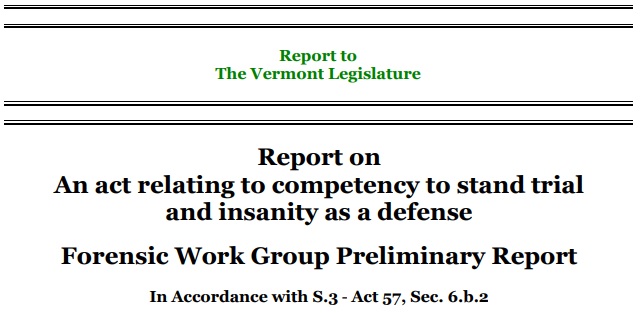The Vermont Department of Mental Health (DMH) delivered the first of two mandated reports by its Forensic Care Working Group to the legislature on Jan. 15, in accordance with Act 57. Passed in 2021, the law initiated a process to contemplate new restrictions, as well as new treatment possibilities, for criminal defendants who, following a judge’s declaration of incompetency to stand trial or a verdict of not guilty by reason of insanity, may enter the custody of DMH.
The 29-member group, which first gathered on July 15, includes representatives from the Department of Corrections; the Department of Disabilities, Aging and Independent Living; the Department of State’s Attorneys and Sheriffs; DMH; the Vermont Medical Society; and Vermont Care Partners. Vermont Psychiatric Survivors appointed “three individuals with lived experience of mental illness, at least one of whom has lived experience of the criminal justice system or the civil commitment system, or both.”
Over the course of five meetings recapitulated by the report, the group studied existing procedures in Vermont’s courts and psychiatric facilities and, through the lenses of “treatment needs, public safety and victim’s rights,” potential alternatives. To this end, the group examined “due process requirements for defendants held without adjudication of a crime,” “competency restoration models from other states,” and “how cases in which competency is not restored are addressed,” among other subjects.
By law, DMH must treat patients in “the least restrictive setting available” according to a clinical judgment, even when patients arrive by way of a criminal court, where they may have faced allegations of violent offenses. As described in DMH’s minutes from the first meeting, a presentation by two of the group’s members, DMH General Counsel Karen Barber and Senior Assistant Attorney General Matt Viens, highlighted the perceived problem: “The criminal justice system is about assuring public safety, but the mental health system is about treatment. Those do not cleanly overlap.”
Doctors, lawyers, nonprofit organizations, and government officials provided “outside expertise” on several occasions. Dr. Michael Norko, the director of forensic services for the Connecticut Department of Mental Health and Addiction Services, summarized the system of care in his state, where civil commitments, following insanity acquittals, fall under the jurisdiction of a volunteer “psychiatric security review board,” empowered to “protect the safety of Connecticut citizens” by approving or rejecting hospitals’ requests for release or security changes for their patients in parole-like hearings.
According to the report, the Forensic Care Working Group’s initial period of “information gathering and general discussion” has yielded two focus points for continuing debate. First, the group intends to consider various formalized “diversion programs” for criminal defendants determined to have mental health needs, such as a “mental health court,” a “program to help people who have been found incompetent to stand trial transition to the hospital setting and then the community setting,” and “community settings for monitoring specialized treatment for individuals that have been found insane and no longer meet hospital level criteria.”
Next, the group hopes to formulate a competency restoration program for defendants who cannot immediately stand trial. This could take place within a dedicated “forensic hospital,” a separate psychiatric facility for patients committed by a criminal court, for which the group will consider the potential cost of construction and staffing.
The House committees on Corrections and Institutions, on Health Care, and on Judiciary, along with the Senate committees on Health and Welfare and on Judiciary, received the preliminary report. Act 57 mandated two subsequent reports in February and August – one considering a notification process for prosecutors in cases where forensic mental health patients fail to comply with orders of nonhospitalization and another following up on the research conducted for the Jan. 15 report with a set of final recommendations on the same subjects – but DMH requested has requested an extension that will consolidate these into one final report in early 2023.

